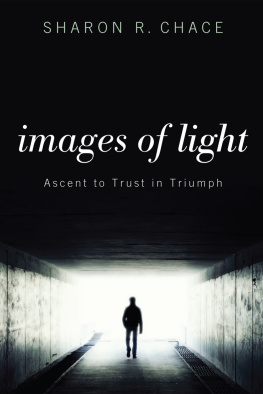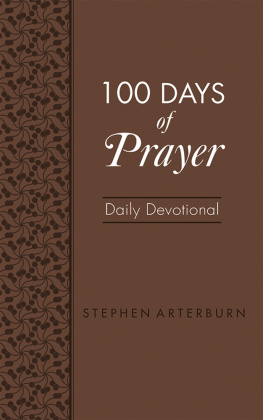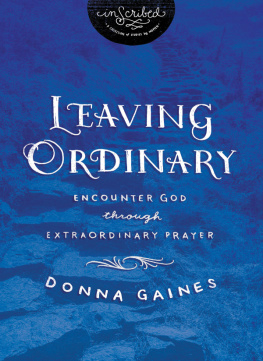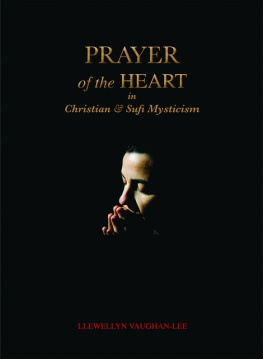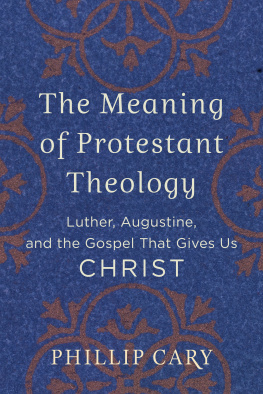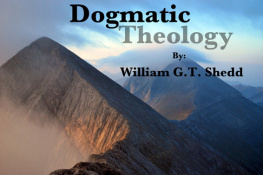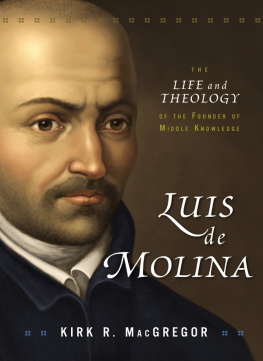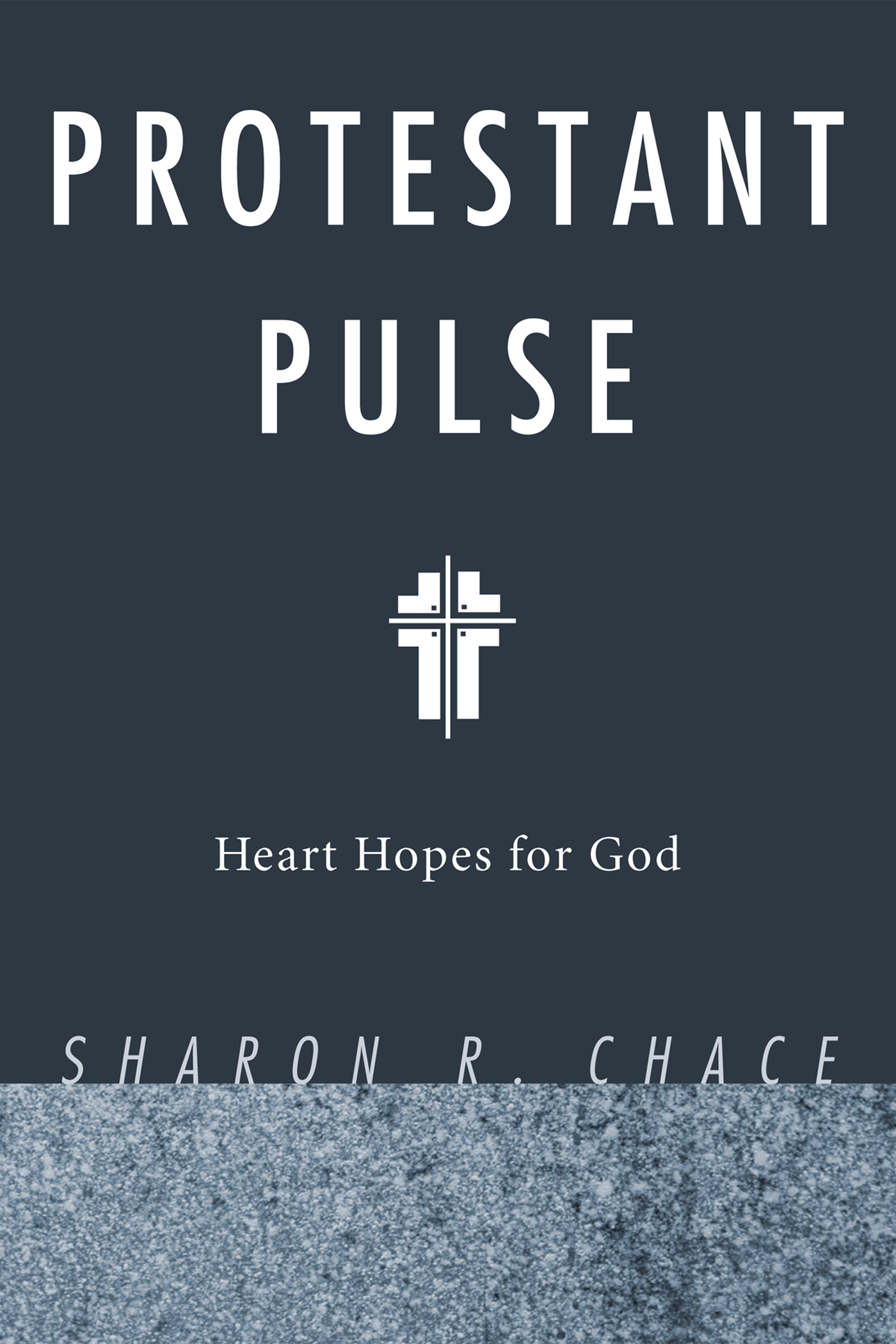Protestant Pulse
Heart Hopes for God
Sharon R. Chace

Protestant Pulse
Heart Hopes for God
Copyright 2009 Sharon R. Chace. All rights reserved. Except for brief quotations in critical publications or reviews, no part of this book may be reproduced in any manner without prior written permission from the publisher. Write: Permissions, Wipf and Stock Publishers, 199 W. 8th Ave., Suite 3, Eugene, OR 97401.Resource Publications
An Imprint of Wipf and Stock Publishers
199 W. 8th Ave., Suite 3
Eugene, OR 97401
www.wipfandstock.com
ISBN 13: 978-1-60608-705-3
EISBN 13:978-1-4982-7446-3
Manufactured in the U.S.A.
Revised Standard Version of the Bible, copyright 1952 [2nd edition, 1971] by the Division of Christian Education of the National Council of the Churches of Christ in the United States of America. Used by permission. All rights reserved.
Scripture quotations marked NE B are from The New English Bible, Copyright 1961 Oxford University Press and Cambridge University Press.The Complete Bible: An American Translation, copyright 1948 The University of Chicago Press. Used by permission. All rights reserved.
New Revised Standard Version Bible, copyright 1989, Division of Christian Education of the National Council of the Churches of Christ in the United States of America. Used by permission. All rights reserved.Permission granted by The J. Paul Getty Museum, Los Angeles for the reproduction of Saint John the Evangelist, 1615, Tempera colors, gold paint, and gold leaf on glazed paper, 23 x 17.2 cm.Poem quoted from The Indigo Bunting Copyright 1951 by Norma Millay Ellis. Reprinted by permission of Elizabeth Barnett, Literary Executor, The Millay Society.
This book is dedicated to my husband, Ernest, and our daughter, Amy Elizabeth, who as a teenager said when I faced a rejected manuscript, Mom, I want you to know that life is going to turn out all right.
Part 1
Sincerely Sharon
A Theological Problem
I have had a number of experiences that are as close as it gets to divine intervention. Even entertaining the idea of divine help presents theological problems. The main question is why would God give me clear directions and even intervene in my personal life when other people are washed away in torrents of water or floods of tears?
The best answer that I can offer came from an unexpected source. In 2008, about thirty years after I first read it, I reread The Language of the Gospel: Early Christian Rhetoric by Amos N. Wilder. Writing about New Testament narratives of miraculous healings and deliverances, he said that such intervention could be seen not as isolated cases but as a manifestation of a general redemption for the whole people of God. Therefore I believe that my personal stories about surprising guidance and assistance suggest that there can be transcendent help, whether through divine or human good will. A logical and heartfelt conclusion is that ultimately justice will prevail.
I shared my findings with Dr. Martin E. Marty who, before his retirement, was the Fairfax M. Cone Distinguished Professor of the History of Modern Christianity at the University of Chicago, as well as senior editor of The Christian Century . He continues to be an authoritative writer on religion and interpreter of the religious landscape. He answered, With Amos Wilder and you I like to think of manifestations of a general redemption for the whole people of God, which we are free to render specific as redemption to each of us, as we go and comein your case to Rockport, and to new adventures.
Yes indeed, our return to Rockport has redemptive features, as you will see in following chapters. My Weston Jesuit education was also part of salvaging my best life. Times of trouble have been redeemed or exchanged into good things like the green saving stamps of the 1950s that could be redeemed for products that householders needed. The message from my experiences may be that there is indeed personal love in the heart of the universe. My readers will have their own thoughts, questions, and conclusions.
. Wilder, The Language Of the Gospel, 71.
Protestant Pulse
Turnings of My Heart
W hen people learned that I, a middle-aged mother and wife of a husband who had been a United Church of Christ minister for ten years, was studying at Weston Jesuit School of Theology, they had one basic question. Most people felt that it was not polite to voice their main concern, but a few less-reticent folk asked directly, Are you going to turn Catholic?
The answer to that question was, and remains, no. Yet I have become a different kind of Protestant. On Valentines Day 1995 I wore a heart monitor to school. My classmates were horrified and said, Dont runthat thing makes us nervous! I said, Dont worry. I am just documenting the Protestant pulse! My journal recorded my spiritual pulse and the turnings of my heart.
My heart beats slowly. I have a crock-pot personality and am slow to warm up. Stewing brings out my best ideas. At an Albion College reunion over twenty-five years ago, my favorite English teacher, Elsie Munro, suggested that instead of piling on classes at the Protestant seminary where I was a special student, I might better take time off to think about my courses. She was premature but had a point. Since my graduation from Weston Jesuit, I continue to reflect. Following advice from Fr. Daniel J. Harrington, SJ, that dovetails with Miss Munros suggestions, I keep on doing the things I do reasonably wellwriting and art. If my art goes awry, I turn to baking. My cookies flavored with demon rum have been eaten at The Christian Century , which is a biweekly journal featuring articles about religion in the news, book reviews, and theological essays .
I first met my friend Dr. Lorine M. Getz when I was her student. She immediately saw beyond my fragility and fatigue, my clumsiness and creative spelling, to the conscientious student that I am. When the time was right for me to consider a degree program, she suggested Weston. Why? I asked. You need their library, she replied. Yes, I needed books and more. Following are personal highlights of my journey from a loss of inner sight to a happier Sharon with deeper delight in grace.
On visiting day at Weston Jesuit School of Theology I came to the point and said, A lot of emphasis is rightly put on service to the church. As a pastors wife, I was about as good at strenuous service as St. Therese of Lisieux was at being an energetic nun! I like to curl up in an afghan and read. Fr. Brian O. McDermott, SJ, who at the time was academic dean, replied, You would be welcome here.
Ignatius of Loyola was the founder of the Society of Jesus (also known as the Jesuits). Along with rigorous courses in theology, biblical studies, ethics, and church history, most students at Weston take a course in Ignatian studies. I confessed that Ignatian studies were of interest to me because I had read Ignatius of Loyola: The Psychology of a Saint by W. W. Meissner, SJ, MD. As a young boy, St. Ignatius lost his mother. My manuscript in circulation was about the adult religious lives of women who as young girls had lost their mothers through death as I, too, had. Fr. McDermott said that he did not know what the coincidence meant but that he was reading Meissners book and had just gotten to the point where St. Ignatiuss mother died.
I applied to Weston Jesuit School of Theology knowing that my basic goal was to further the best use of my life, but I lacked certainty about how to use my gifts vocationally. My central spiritual dilemma was clear. As would often be my practice at Weston, I silently quoted to myself a hymn from the Pilgrim Hymnal . The last words from the second verse of Spirit of God Descend upon My Heart summarized my condition. But take the dimness of my soul away. Clarity in ones personal life makes it easier to see God.


